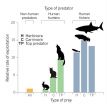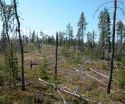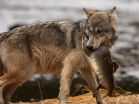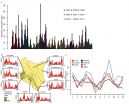Humans as predators: An unsustainable appetite for adults and carnivores
2015-08-20
(Press-News.org) This news release is available in Japanese.
Humans are just one of many predators in this world, but a new study highlights how their intense tendency to target and kill adult prey, as well as other carnivores, sets them distinctly apart from other predators. As humans kill other species in their reproductive prime, there can be profound implications -- including widespread extinction and restructuring of food webs and ecosystems--in both terrestrial and marine systems. To evaluate the nature of human predation compared to nonhuman predation, Chris Darimont et al. conducted a survey of 2,125 species of predators around the world in marine and land environments. The results reveal that humans tend to prey on adults of other species at rates up to 14 times higher than other predators, with particularly intense exploitation of terrestrial carnivores and fishes. Among fisheries, the authors found that the predation effect was even more pronounced in the Atlantic Ocean, which they suggest is a result of higher human densities and reduced fish biomass (from a longer period of regular and intensive fishing); the situation in the Atlantic reflects how the low abundance of economically valuable prey can drive aggressive exploitation. All together, the unique predation behavior of humans can have significant impacts on ecosystems, altering observable traits like size, as well as life-history traits of other species, modifying the reproductive potential of populations, and transforming ecological interactions of food webs. A Perspective by Boris Worm takes a closer look at our tendency towards big catches, and its implications.
INFORMATION:
Article #16: "The unique ecology of human predators," by C.T. Darimont; C.H. Fox; H.M. Bryan; T.E. Reimchen at University of Victoria in Victoria, BC, Canada; C.T. Darimont; C.H. Fox; H.M. Bryan at Raincoast Conservation Foundation in Sidney, BC, Canada; C.T. Darimont; H.M. Bryan at Hakai Institute in Heriot Bay, BC, Canada.
[Attachments] See images for this press release:

ELSE PRESS RELEASES FROM THIS DATE:
2015-08-20
This news release is available in Japanese.
In this special issue, the editors of Science invite experts to provide closer looks at how natural and human-induced environmental changes are affecting forests around the world, from the luscious, diverse forests of the tropics, to the pristine, resilient boreal forests of the north. The special issue is complemented by a package from Science's news department.
Amid extreme environmental and climate changes, Susan Trumbore and colleagues highlight the urgency of monitoring forest health, especially ...
2015-08-20
This news release is available in Japanese.
Amid continued difficulties around assessing bioweapons threats, especially given limited empirical data, Crystal Boddie and colleagues took another route to gauge their danger: the collective judgment of multiple experts. The experts' opinions on bioweapons-related risks were quite diverse, the Policy Forum authors say, adding to the challenge around developing a regulatory system for legitimate dual use research. Boddie et al. explain how they employed a Delphi Method study to query the beliefs and opinions of 59 experts ...
2015-08-20
An examination of the immune genes of the southern African Khoe-San people has revealed a completely new kind of mutation, according to researchers at the Stanford University School of Medicine. The gene variant likely contributes to healthier babies, although the variant can also lower resistance to disease.
The findings grew out of a long-term effort by Peter Parham, PhD, professor of structural biology and of microbiology and immunology, to understand how immune system genes make us reject organ transplants.
A paper detailing the findings will be published online ...
2015-08-20
CORVALLIS, Ore. - Myriad regulations and certification requirements around the world are making it virtually impossible to use genetically engineered trees to combat catastrophic forest threats, according to a new policy analysis published this week in the journal Science.
In the United States, the time is ripe to consider regulatory changes, the authors say, because the federal government recently initiated an update of the overarching Coordinated Framework for the Regulation of Biotechnology, which governs use of genetic engineering.
North American forests are suffering ...
2015-08-20
Are humans unsustainable 'super predators'?
Want to see what science now calls the world's "super predator"? Look in the mirror.
Research published today in the journal Science by a team led by Dr. Chris Darimont, the Hakai-Raincoast professor of geography at the University of Victoria, reveals new insight behind widespread wildlife extinctions, shrinking fish sizes and disruptions to global food chains.
"These are extreme outcomes that non-human predators seldom impose," Darimont's team writes in the article titled "The Unique Ecology of Human Predators."
"Our ...
2015-08-20
Scientists have exposed a chink in the armour of disease-causing bugs, with a new discovery about a protein that controls bacterial defences.
Bacteria react to stressful situations - such as running out of nutrients, coming under attack from antibiotics or encountering a host body's immune system - with a range of defence mechanisms. These include constructing a resistant outer coat, growing defensive structures on their surface or producing enzymes that break down the DNA of an attacker.
The new research shows that a protein called sigma54 holds a bacterium's defences ...
2015-08-20
WEST LAFAYETTE, Ind. -- Results of the XENON100 experiment are a bright spot in the search for dark matter.
The team of international scientists involved in the project demonstrated the sensitivity of their detector and recorded results that challenge several dark matter models and a longstanding claim of dark matter detection. Papers detailing the results will be published in upcoming issues of the journals Science and Physical Review Letters.
Dark matter is an abundant but unseen matter in the universe considered responsible for the gravitational force that keeps the ...
2015-08-20
Scientists studying the 2009 A/H1N1 influenza pandemic have found that the inconsistent regional timing of pandemic waves in Mexico was the result of interactions between school breaks and regional variations in humidity.
The research published in PLOS Computational Biology, led by Dr. James Tamerius at the University of Iowa and Dr. Gerardo Chowell at Georgia State University, applied mathematical models to understand the social and environmental processes that generated two distinct pandemic outbreaks ("waves") in Mexico during the summer and fall of 2009.
The summer ...
2015-08-20
Children who have been abused or exposed to other types of trauma typically experience more intense emotions than their peers, a byproduct of living in volatile, dangerous environments.
But what if those kids could regulate their emotions? Could that better help them cope with difficult situations? Would it impact how effective therapy might be for them?
A University of Washington-led team of researchers sought to address those questions by studying what happens in the brains of maltreated adolescents when they viewed emotional images, and then tried to control their ...
2015-08-20
PRINCETON, N.J.--Tracking mobile phone data is often associated with privacy issues, but these vast datasets could be the key to understanding how infectious diseases are spread seasonally, according to a study published in the Proceedings of the National Academy of Sciences.
Princeton University and Harvard University researchers used anonymous mobile phone records for more than 15 million people to track the spread of rubella in Kenya and were able to quantitatively show for the first time that mobile phone data can predict seasonal disease patterns.
Harnessing ...
LAST 30 PRESS RELEASES:
[Press-News.org] Humans as predators: An unsustainable appetite for adults and carnivores



